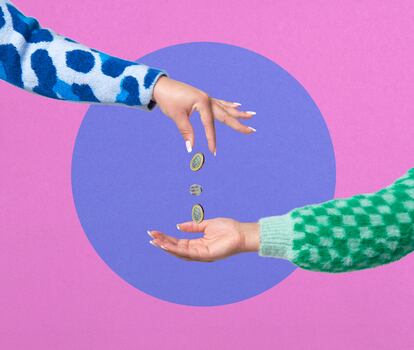The friendship wealth gap: ‘Every time I get asked to a wedding, my bank account and I get the jitters’
It often happens between the late twenties and early thirties: one part of the group increases their purchasing power and the other doesn’t. It’s the beginning of the end of many relationships

The situation may be familiar to many: a group of friends is having dinner. Someone suggests ordering dessert to go with the half-full wine glasses. The check arrives. And that’s where the trouble begins. Some members of the group want to split the bill equally, while others feel they should just pay for what they had. “I only had water to drink,” recalls Verónica, 33, about a recent dinner with friends in Madrid, Spain. “And I didn’t have dessert.”
Verónica, who said she only wanted to pay for what she ate and drank, doesn’t know what her friends thought about it. But she has given it a lot of thought. “I feel like the party pooper of the group. It seems that at every dinner event, I am the one to raise my voice so as not to pay more than what I owe, and it bothers me that this keeps hapenning over and over again, as if no one else was capable of sympathizing with me.”
Verónica works in advertising and makes under €22,000 a year. Her monthly salary is €1,400 and out of that she pays €450 for a room in a shared apartment in Madrid. She manages to make it to the end of the month by the skin of her teeth, and sees an “huge gap” between herself and her friends, who she figures are making between €40,000 and €60,000. Veronica sometimes avoids their social events altogether. “I exclude myself from many plans, because I feel guilty just for going, as if the rest of the group were thinking: ‘If you can’t afford it, why are you coming?’”
There is an important concept here, which is generosity: it’s not only what I give to others, but also what I allow myself to receiveElena Daprá, psychologist
Little by little, the economic gap between friends can become a real gap: on one side, there are those with money, on the other, those without. It has come to be known as the “friendship wealth gap.”
“It shows in everything,” explains María, 30, who works at an art gallery and earns the minimum wage. “From buying gifts, going to weddings, going out to eat, organizing a barbecue or even the pace at which you order drinks at a bar… for me, splitting the bill equally means financial ruin.”
Everyone interviewed for this article had a similar story to tell: weddings that cause conflict because the invited party now has to choose between going to the event or going on vacation; hen and stag parties that cost guests over €1,000 because they include trips, hotel stays, meals and many, many drinks. “Every time someone tells me that they are getting married, my bank account and I get the jitters,” says María.
Figures show that this situation is not all that common. “Our social networks are stratified by socioeconomic class, so people tend to have friends with incomes that are similar to theirs,” notes Kiko Llaneras, a reporter specializing in statistics at EL PAÍS. A large study in the United States analyzed 21 billion friendships on Facebook for greater precision: “A curious addition to the study is that they can trace the origin of many friendships,” writes Llaneras, “and there are differences. Poorer people have a lot of friends from their neighborhood, while rich people make a lot of ties in college. Both things contribute to unite us by our economic level.”
“The wealth gap typically becomes noticeable in your late 20s and early 30s, when friends who were once your financial equals begin to pull away from you in income. University peers you shared noodles with in dingy flat-shares start frequenting expensive restaurants with their colleagues; school friends go on lavish holidays you cannot afford,” wrote the journalist Sirin Kale in an article for The Guardian dedicated to the subject. “As the wealth gap widens, once-solid relationships begin to buckle and cave under the pressure of all that is unsaid.”
“From the perspective of psychology, when a person talks about money, what they are letting others see is that money is one of their priorities. Seen from the outside, it is like presenting yourself to the world as a superficial, frivolous or insubstantial person,” says Elena Daprá, a Madrid psychologist. “In society, conversations about money are censored, because it is viewed as a superficial way of evaluating the world.” This expert warns that this affects many situations: it is frowned upon to ask about the salary at a job interview, and it considered bad form to reveal one’s salary in front of friends. There is also the other side: avoiding talking about money out of shame, in a society that associates money with success and lack of it with failure.
“Money has gone from being a means of exchange and a measure of trade to being a central value in our scale of values, due to the consumerist and individualistic attitude of our societies,” says Iván Parro, a sociologist, researcher and author of the 2015 study Money and the Economy in Times of Crisis. Reflections for Hard Times. According to him, this change is not as recent as we think, arising at the end of World War II, with the idea of the importance of having solid material belongings to cling to. But in recent years it has become more visible and there has been an acceleration in the rates of consumption, with a prevalence of disposable products. “During recent crises this attitude has been strengthened,” he says. In an increasingly individualistic society, “money provides an identity, the idea of having a different position from other people.”

In the end, it’s not so much about money as it is about status. And people have cared about status for centuries. But there was a time when social classes were much more clearly defined, and exchanges between them far and few. “In sociology, people have been talking about the crisis of the class concept for a long time now,” explains the sociologist Iván Parro, noting that the concept of middle-class is profoundly misleading: “It is more or less agreed that the middle class is one that has to work to maintain an acceptable standard of living, but this could apply equally to people from the working class or upper class. In the end, we are creating a trap: whether we consider ourselves part of one class or another has largely to do with lifestyle, in the sense that we have been influenced to follow certain guidelines, advice, clothing styles or even cultural interests.”
And whoever has reached a certain point in life usually does not want to go back. Several studies on the concept of meritocracy have shown that the more money a person has, the more likely they are to believe that success comes from hard work and talent, rather than luck or privilege. In this sense, it is easy to fall into judgment and think that friends with less money have simply not tried hard enough. “The problem with this idea is that effort is just one variable within the universe of variables that influence people’s lives,” explains the sociologist.
Oscar Wilde said that “a true friend stabs you in the front, not the back.” Bridging the wealth gap between friends is not easy: “There is an important concept here, which is generosity: it’s not only what I give to others, but also what I allow myself to receive,” explains the psychologist Elena Daprá. “If we eliminate generosity, sincerity and communication, we are lost.” Or, to put it bluntly, friendships end when people value money more than friends.
Tu suscripción se está usando en otro dispositivo
¿Quieres añadir otro usuario a tu suscripción?
Si continúas leyendo en este dispositivo, no se podrá leer en el otro.
FlechaTu suscripción se está usando en otro dispositivo y solo puedes acceder a EL PAÍS desde un dispositivo a la vez.
Si quieres compartir tu cuenta, cambia tu suscripción a la modalidad Premium, así podrás añadir otro usuario. Cada uno accederá con su propia cuenta de email, lo que os permitirá personalizar vuestra experiencia en EL PAÍS.
¿Tienes una suscripción de empresa? Accede aquí para contratar más cuentas.
En el caso de no saber quién está usando tu cuenta, te recomendamos cambiar tu contraseña aquí.
Si decides continuar compartiendo tu cuenta, este mensaje se mostrará en tu dispositivo y en el de la otra persona que está usando tu cuenta de forma indefinida, afectando a tu experiencia de lectura. Puedes consultar aquí los términos y condiciones de la suscripción digital.









































